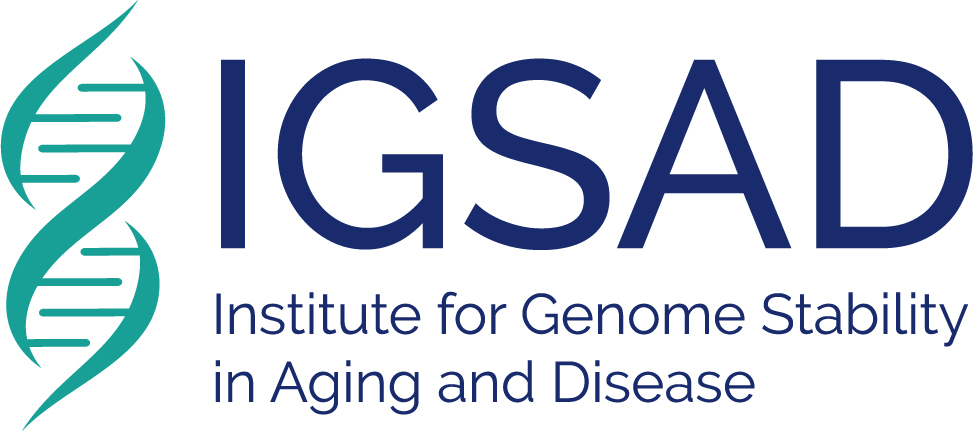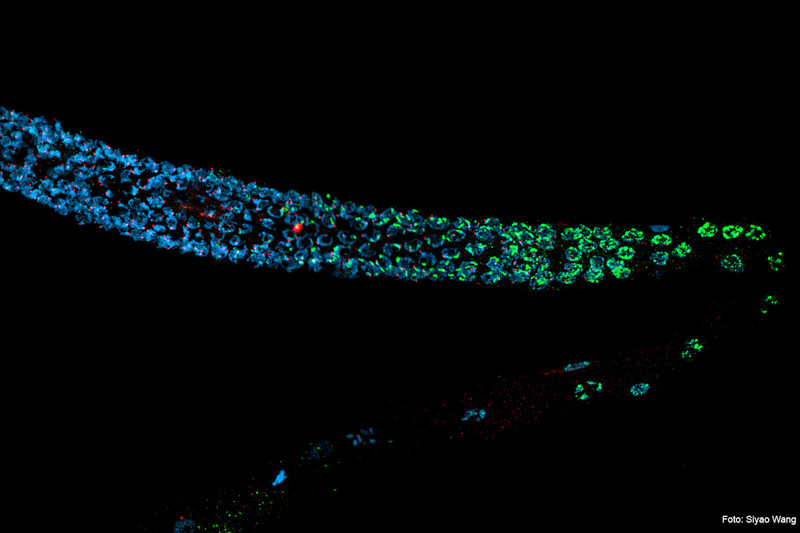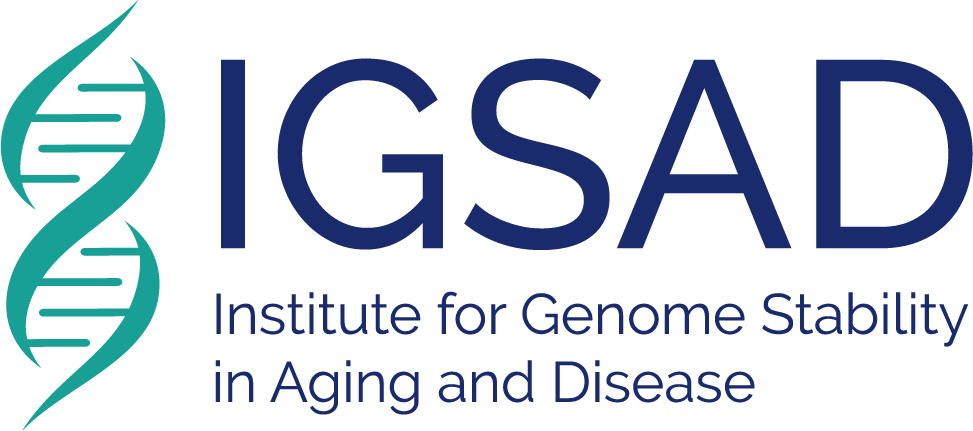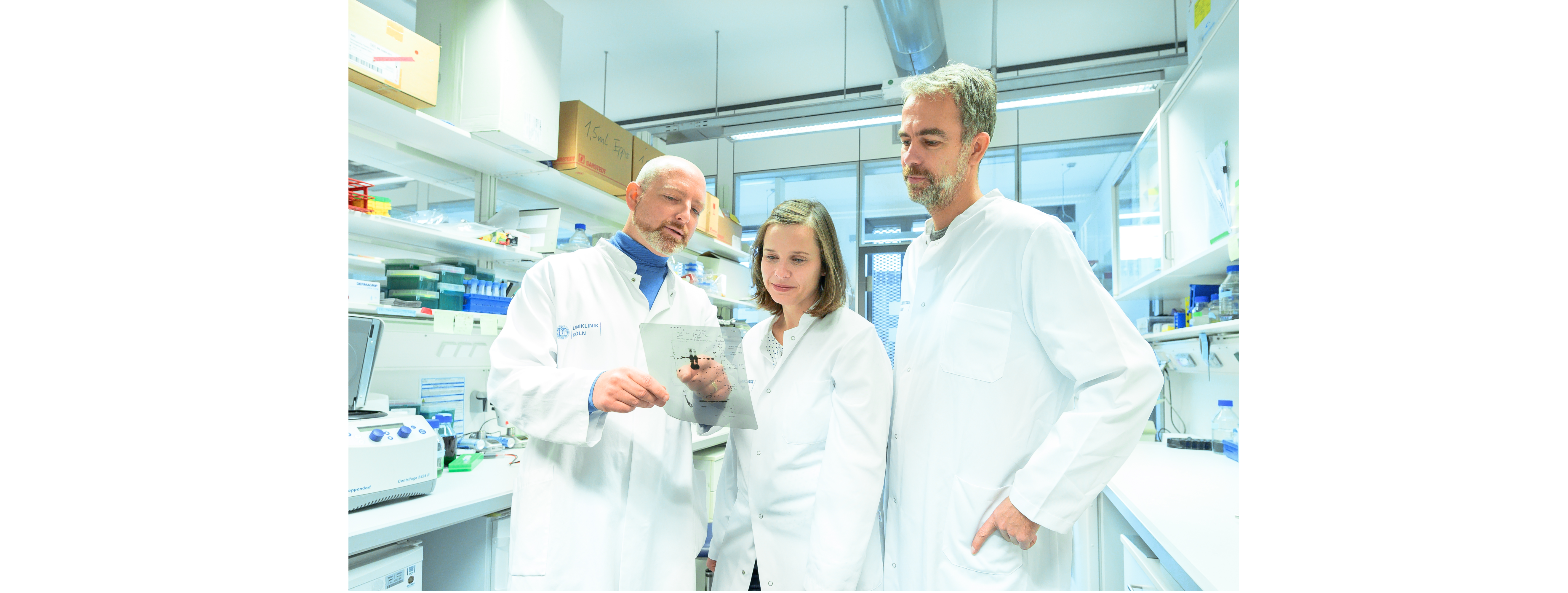The Institute
 The Institute for Genome Stability in Aging and Disease (IGSAD) is devoted to investigating the molecular mechanism of aging and chronic diseases. Aging is strongly correlated with a host of human pathologies, most prominently with cancer, inflammatory, cardiovascular and neurodegenerative diseases such as Alzheimer's and Parkinson's, as well as general functional decline. It is, therefore, of outstanding interest to further our understanding of the mechanisms underlying human aging and disease. DNA damage has been shown to play a central role both in cancer and, more recently, in aging. DNA damage can lead to genetic aberrations such as mutations that fuel cancer development. DNA damage can also interfere with transcription and replication leading to cell death, cellular senescence, and decline of cellular functionality. Consequently, stem cell compartments are deprived and differentiated cells degenerate. To protect from these outcomes, eukaryotes have evolved the DNA damage response, a complex network of signaling and repair mechanisms. The DNA damage response spans across all cellular compartments ranging from epigenetic alterations to the disruption of metabolism and proteostasis, mitochondrial dysfunction and inflammation. The IGSAD aims to unravel the molecular mechanism through which DNA damage promotes the aging process, causes cancer and age-related diseases. IGSAD scientists investigate DNA repair mechanisms that maintain the stability of the genome and how genome structure is maintained. We are using the genetic model organism Saccharomyces cerevisiae and Caenorhabditis elegans, mammalian disease models and human tissue cultures. IGSAD groups are associated with the CECAD excellence cluster of aging research, the University Hospital of Cologne, the Max Planck Institute for the Biology of Aging, and the German Aerospace Center (DLR).
The Institute for Genome Stability in Aging and Disease (IGSAD) is devoted to investigating the molecular mechanism of aging and chronic diseases. Aging is strongly correlated with a host of human pathologies, most prominently with cancer, inflammatory, cardiovascular and neurodegenerative diseases such as Alzheimer's and Parkinson's, as well as general functional decline. It is, therefore, of outstanding interest to further our understanding of the mechanisms underlying human aging and disease. DNA damage has been shown to play a central role both in cancer and, more recently, in aging. DNA damage can lead to genetic aberrations such as mutations that fuel cancer development. DNA damage can also interfere with transcription and replication leading to cell death, cellular senescence, and decline of cellular functionality. Consequently, stem cell compartments are deprived and differentiated cells degenerate. To protect from these outcomes, eukaryotes have evolved the DNA damage response, a complex network of signaling and repair mechanisms. The DNA damage response spans across all cellular compartments ranging from epigenetic alterations to the disruption of metabolism and proteostasis, mitochondrial dysfunction and inflammation. The IGSAD aims to unravel the molecular mechanism through which DNA damage promotes the aging process, causes cancer and age-related diseases. IGSAD scientists investigate DNA repair mechanisms that maintain the stability of the genome and how genome structure is maintained. We are using the genetic model organism Saccharomyces cerevisiae and Caenorhabditis elegans, mammalian disease models and human tissue cultures. IGSAD groups are associated with the CECAD excellence cluster of aging research, the University Hospital of Cologne, the Max Planck Institute for the Biology of Aging, and the German Aerospace Center (DLR).

Damage to the paternal genome of the nematode Caenorhabditis elegans cannot be repaired and is instead passed on to its offspring, while the female egg repairs or limits the damage / publication in 'Nature'.
Whether radiation exposure of fathers can have consequences on their children is one of the most long-standing questions in radiation biology. Using the nematode Caenorhabditis elegans as a model, Professor Dr Björn Schumacher and his team discovered that radiation damage to mature sperm cannot be repaired but is instead passed on to the offspring. In contrast, female eggs either accurately repair the damage or, if the damage is too severe, are eliminated and no damage is passed on. However, when the egg is fertilized with a sperm that has been damaged by radiation, the maternal repair proteins that are provided by the egg try to repair the paternal DNA. For this purpose, a highly error-prone repair mechanism is used and fuses the broken DNA pieces randomly. These random fusions of the breaks then lead to structural changes in the paternal chromosomes. The offspring that result from this now carry the chromosome damage and in turn their offspring show severe developmental defects. The work done on C. elegans lays the foundation for a better understanding of the mechanisms for the heritable effects of paternal radiation exposure.
This work has now been published under the title 'Inheritance of paternal DNA damage by histone-mediated repair restriction' in Nature.
The offspring that results from male animals that have been exposed to radiation and healthy female worms carry on the so-called structural variations – random connections of chromosome parts. In the offspring, these aberrations lead to recurrent breaks but this damage can no longer be repaired. Instead, the damaged chromosomes are shielded from accurate repair by proteins, so-called histones, that densely pack the long strands of DNA. In the densely packed DNA, the breaks can no longer be reached by the repair proteins. The packed DNA structures are held tightly together by the specific histone proteins, HIS-24 and HPL-1. When those histone proteins are removed, the paternally inherited damage is completely eliminated and viable offspring can be produced. The finding that histone proteins govern the accessibility of DNA for repairs could provide effective therapeutic targets for treating radiation damage.
Is this also relevant for radiation damage in humans? In addition to the work on nematodes, the team detected the same structural variants, or randomly assembled chromosomes, in humans. Also here, the chromosome aberrations were specifically passed on from the fathers but not the mothers. For this, the scientists analysed various data sets from the 1000 Genome Project that contains genetic data from more than a thousand people and the Islandic deCODE project with genetic data from the respective mothers, fathers and children.
"Genome aberrations, especially structural variations in chromosomes, which develop in the paternal germline, are thought to increase the risk of disorders like autism and schizophrenia," Schumacher said. This means that also in humans, mature sperm needs to be especially protected from radiation damage, and damaged mature sperm should not be used for conception. He added, "Such damage could potentially be inflicted during radiotherapy or chemotherapy and thus pose a risk in the two months that it takes to generate new sperm to replace the damaged one." This is because in contrast to mature sperm, newly generated sperm have the capacity to accurately repair the damage.
Interestingly, the scientists found those structural variations in the chromosomes also in nematodes in the wild and in the human population. These results suggest that damage to mature sperm and the inaccurate repair of paternal DNA in the zygote could be major drivers for genetic diversity during evolution and might be responsible for genetic diseases in humans.
The study was carried out at the Institute for Genome Stability in Ageing and Disease at the CECAD Cluster of Excellence for Aging Research in the University of Cologne and received funding from the German Research Foundation (DFG).
Media Contact:
Professor Dr Björn Schumacher
Institute for Genome Stability in Ageing and Disease
+49 221 478 84202
bjoern.schumacher[at]uni-koeln.de
Press and Communications Team:
Dr Anna Euteneuer
+49 221 470 1700
a.euteneuer[at]verw.uni-koeln.de
Publication:
Wang S, Meyer DH, Schumacher B, Inheritance of paternal DNA damage by histone-mediated repair restriction, Nature 2022
www.nature.com/articles/s41586-022-05544-w
Further Information:
1000 Genome Project: https://www.internationalgenome.org/data/


